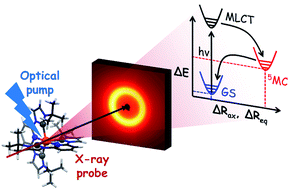当前位置:
X-MOL 学术
›
Chem. Sci.
›
论文详情
Our official English website, www.x-mol.net, welcomes your feedback! (Note: you will need to create a separate account there.)
Tracking the picosecond deactivation dynamics of a photoexcited iron carbene complex by time-resolved X-ray scattering†
Chemical Science ( IF 8.4 ) Pub Date : 2017-10-31 00:00:00 , DOI: 10.1039/c7sc02815f Denis Leshchev 1 , Tobias C B Harlang 2, 3 , Lisa A Fredin 4 , Dmitry Khakhulin 5 , Yizhu Liu 6 , Elisa Biasin 3 , Mads G Laursen 3 , Gemma E Newby 1 , Kristoffer Haldrup 3 , Martin M Nielsen 3 , Kenneth Wärnmark 6 , Villy Sundström 2 , Petter Persson 4 , Kasper S Kjær 2, 3 , Michael Wulff 1
Chemical Science ( IF 8.4 ) Pub Date : 2017-10-31 00:00:00 , DOI: 10.1039/c7sc02815f Denis Leshchev 1 , Tobias C B Harlang 2, 3 , Lisa A Fredin 4 , Dmitry Khakhulin 5 , Yizhu Liu 6 , Elisa Biasin 3 , Mads G Laursen 3 , Gemma E Newby 1 , Kristoffer Haldrup 3 , Martin M Nielsen 3 , Kenneth Wärnmark 6 , Villy Sundström 2 , Petter Persson 4 , Kasper S Kjær 2, 3 , Michael Wulff 1
Affiliation

|
Recent years have seen the development of new iron-centered N-heterocyclic carbene (NHC) complexes for solar energy applications. Compared to typical ligand systems, the NHC ligands provide Fe complexes with longer-lived metal-to-ligand charge transfer (MLCT) states. This increased lifetime is ascribed to strong ligand field splitting provided by the NHC ligands that raises the energy levels of the metal centered (MC) states and therefore reduces the deactivation efficiency of MLCT states. Among currently known NHC systems, [Fe(btbip)2]2+ (btbip = 2,6-bis(3-tert-butyl-imidazol-1-ylidene)pyridine) is a unique complex as it exhibits a short-lived MC state with a lifetime on the scale of a few hundreds of picoseconds. Hence, this complex allows for a detailed investigation, using 100 ps X-ray pulses from a synchrotron, of strong ligand field effects on the intermediate MC state in an NHC complex. Here, we use time-resolved wide angle X-ray scattering (TRWAXS) aided by density functional theory (DFT) to investigate the molecular structure, energetics and lifetime of the high-energy MC state in the Fe–NHC complex [Fe(btbip)2]2+ after excitation to the MLCT manifold. We identify it as a 260 ps metal-centered quintet (5MC) state, and we refine the molecular structure of the excited-state complex verifying the DFT results. Using information about the hydrodynamic state of the solvent, we also determine, for the first time, the energy of the 5MC state as 0.75 ± 0.15 eV. Our results demonstrate that due to the increased ligand field strength caused by NHC ligands, upon transition from the ground state to the 5MC state, the metal to ligand bonds extend by unusually large values: by 0.29 Å in the axial and 0.21 Å in the equatorial direction. These results imply that the transition in the photochemical properties from typical Fe complexes to novel NHC compounds is manifested not only in the destabilization of the MC states, but also in structural distortion of these states.
中文翻译:

通过时间分辨 X 射线散射跟踪光激发铁卡宾络合物的皮秒失活动力学†
近年来,用于太阳能应用的新型铁心N-杂环卡宾(NHC)配合物得到了发展。与典型的配体系统相比,NHC 配体为 Fe 配合物提供了更长寿命的金属-配体电荷转移 (MLCT) 态。这种寿命的延长归因于 NHC 配体提供的强配体场分裂,提高了金属中心 (MC) 态的能级,从而降低了 MLCT 态的失活效率。在目前已知的NHC系统中,[Fe(btbip) 2 ] 2+ (btbip = 2,6-bis(3-叔丁基咪唑-1-亚基)吡啶)是一种独特的配合物,因为它表现出短寿命的MC状态的寿命为几百皮秒。因此,该复合物允许使用来自同步加速器的 100 ps X 射线脉冲来详细研究 NHC 复合物中中间 MC 态的强配体场效应。在这里,我们使用时间分辨广角 X 射线散射 (TRWAXS) 辅助密度泛函理论 (DFT) 来研究 Fe-NHC 配合物 [Fe(btbip) 中高能 MC 态的分子结构、能量学和寿命。 ) 2 ] 2+激励到 MLCT 流形后。我们将其识别为 260 ps 金属中心五重态 ( 5 MC) 态,并改进了激发态配合物的分子结构,验证了 DFT 结果。利用有关溶剂流体动力学状态的信息,我们还首次确定5 MC 状态的能量为 0.75 ± 0.15 eV。我们的结果表明,由于 NHC 配体导致配体场强增加,从基态过渡到5 MC 态时,金属与配体键的延伸量异常大:轴向延伸 0.29 Å,轴向延伸 0.21 Å。赤道方向。这些结果表明,光化学性质从典型的 Fe 配合物到新型 NHC 化合物的转变不仅表现在 MC 态的不稳定上,而且还表现在这些态的结构扭曲上。
更新日期:2017-10-31
中文翻译:

通过时间分辨 X 射线散射跟踪光激发铁卡宾络合物的皮秒失活动力学†
近年来,用于太阳能应用的新型铁心N-杂环卡宾(NHC)配合物得到了发展。与典型的配体系统相比,NHC 配体为 Fe 配合物提供了更长寿命的金属-配体电荷转移 (MLCT) 态。这种寿命的延长归因于 NHC 配体提供的强配体场分裂,提高了金属中心 (MC) 态的能级,从而降低了 MLCT 态的失活效率。在目前已知的NHC系统中,[Fe(btbip) 2 ] 2+ (btbip = 2,6-bis(3-叔丁基咪唑-1-亚基)吡啶)是一种独特的配合物,因为它表现出短寿命的MC状态的寿命为几百皮秒。因此,该复合物允许使用来自同步加速器的 100 ps X 射线脉冲来详细研究 NHC 复合物中中间 MC 态的强配体场效应。在这里,我们使用时间分辨广角 X 射线散射 (TRWAXS) 辅助密度泛函理论 (DFT) 来研究 Fe-NHC 配合物 [Fe(btbip) 中高能 MC 态的分子结构、能量学和寿命。 ) 2 ] 2+激励到 MLCT 流形后。我们将其识别为 260 ps 金属中心五重态 ( 5 MC) 态,并改进了激发态配合物的分子结构,验证了 DFT 结果。利用有关溶剂流体动力学状态的信息,我们还首次确定5 MC 状态的能量为 0.75 ± 0.15 eV。我们的结果表明,由于 NHC 配体导致配体场强增加,从基态过渡到5 MC 态时,金属与配体键的延伸量异常大:轴向延伸 0.29 Å,轴向延伸 0.21 Å。赤道方向。这些结果表明,光化学性质从典型的 Fe 配合物到新型 NHC 化合物的转变不仅表现在 MC 态的不稳定上,而且还表现在这些态的结构扭曲上。


























 京公网安备 11010802027423号
京公网安备 11010802027423号